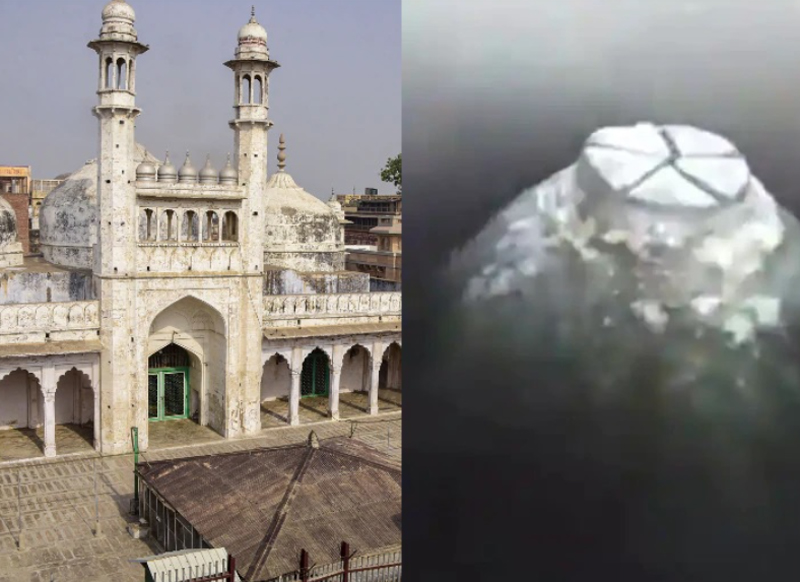VARANASI (UP), Oct 14: A Varanasi court on Friday rejected the Hindu petitioners’ plea for carbon dating of what is claimed to be a ‘shivling’ in the Gyanvapi mosque premises, a government counsel said.
District Judge AK Vishvesha turned down the plea seeking scientific investigation and carbon dating of the ‘shivling’, citing Supreme Court directives for its safe keeping so that no tampering can be done, said government counsel Rana Sanjiv Singh.
Vishnu Shankar Jain, advocate of the four Hindu petitioners seeking carbon dating of the ‘shivling’, said they would now approach the apex court with their demand.
The Varanasi court has fixed October 17 as the next date of hearing in the Gyanvapi mosque-Shringar Gauri case, Singh said. The court is hearing the plea of Hindu petitioners who had sought permission for regular worship of deities whose idols are located on an outer wall of the mosque.
The court said in view of the SC rulings and keeping public sentiments in mind, the carbon dating cannot be allowed and the “wazookhana” will remain sealed, said Shivam Gaur, lawyer from the Hindu side.
Four of the five Hindu parties had sought carbon dating of the ‘shivling’ found during a court-mandated videography survey of the mosque premises close to the “wazookhana”, a small reservoir used by Muslim devotees to perform ritual ablutions before offering Namaz.
The mosque management committee claims that the structure is not a ‘shivling’ but a part of the “wazookhana” reservoir system.
Judge Vishvesha said, “The petitioners from number 2 to 5 had prayed that carbon dating or any other scientific technique like ground penetrating radar be used and the composition, nature and age of the ‘Shiva Lingam’ found during the work of court commissioner on May 16 be determined.”
The SC in its order on May 17, 2022, in the present case, had directed that the so-called ‘Shiva Lingam’ found during the work of court commissioner be kept safe, he said.
“If on the use of carbon dating technique or ground penetrating radar, the so-called ‘Shiva Lingam’ is damaged, then it would be a violation of the May 17, 2022, order of the Supreme Court. Apart from this, by doing so, the religious feelings of the common public may be hurt,” he further said.
“I am also of the view that at this level, it would not be appropriate to direct the Archaeological Survey of India to determine the age, nature and composition of the so-called ‘Shiva Lingam’ found during the work of advocate commissioner.
“And if this is ordered, then it seems that there is no possibility of finding a judicious solution to the questions involved in the dispute.” the judge said.
After completion of hearing of the Hindu side and the mosque committee on Tuesday, the district court had decided to pronounce its verdict on October 14.
Emerging from the court, Jain told reporters, “Our struggle will continue. This fight is for truth… I want to say that we are those people who do not get over excited in victory, and do not become too sad in defeat. This is our struggle and it will continue.
“The struggle is for justice and truth. We are firm on our demand for scientific survey, and we will go to the Supreme Court with that demand. I know this much that our struggle for our God and for those who we worship will continue and with enthusiasm.”
He added, “Mohammad Ghori had invaded India 17 times, and emerged victorious in his 18th attempt.”
Asked if there was a division in the Hindu side over the carbon dating demand, Jain said objections of Rakhi Singh’s lawyer were clarified.
Of the five Hindu petitioners in the case, Singh had not called for carbon dating.
“Everyone was of the view that there should be scientific investigation,” he said.
Advocate Mumtaz Ahmed, who appeared for the Muslim side, had earlier said they have told the court that carbon dating cannot be done.
If the object gets damaged in the name of carbon dating, it amounts to defiance of the Supreme Court order, he had said.
The Muslim side had also contended that the SC had asked the Varanasi district magistrate to keep the structure safe and in such a situation, getting it examined cannot be justified.
The Muslim side had also opined that the original case is about the worship of Shringar Gauri while the structure in the mosque has nothing to do with it.
In such a condition, neither any investigation can be done by the Archaeological department nor a legal report be called after conducting a scientific investigation, they had said.
On the other hand, the Hindu petitioners had contended that the ‘shivling’ found in the “wazookhana” was part of the case property while putting forward their arguments in favour of carbon-dating of the structure.
The Gyanvapi mosque is located next to the iconic Kashi Vishwanath temple and the case in the Varanasi court has revived claims that the mosque was built on a portion of the Hindu structure demolished on the orders of Mughal emperor Aurangzeb. (PTI)


